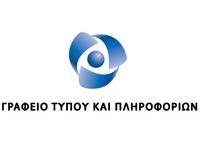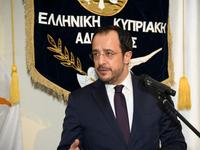Press Releases
21-10-2020 13:10
Joint Declaration of the 8th Cyprus - Egypt - Greece Trilateral Summit, Nicosia, October 21st, 2020
We, Nicos Anastasiades, the President of the Republic of Cyprus, Abdel Fattah El-Sisi, the President of the Arab Republic of Egypt and Kyriakos Mitsotakis, the Prime Minister of the Hellenic Republic, met in Nicosia, Cyprus, on October 21st, 2020, in the framework of the trilateral cooperation and coordination between our three countries. We discussed a broad range of issues and reiterated the importance of enhancing our efforts in promoting peace, stability, security and prosperity in the East Mediterranean.
We discussed the unprecedented challenge of Covid-19 and the enormous impact the pandemic poses on social, economic and healthcare systems globally. With regards to the ongoing efforts to tackle the crisis, we exchanged views and experiences on best possible practices and lessons learned. The magnitude of the challenge, led the leaders to examine the possibility of future cooperation on prevention and regional management of pandemics.
We reviewed the latest stance of the ambitious and ongoing cooperation mechanism, which is considered as an important milestone in the relations between our three countries. Furthermore, we elaborated on progress achieved in sectoral cooperation, inter alia, in the fields of defense and security, energy, investments, tourism, diaspora, protection of the environment, protection of cultural heritage, research and innovation, and education.
We expressed our desire to continue strengthening our cooperation through a series of agreements on the exploration and transfer of natural gas, which further highlights the fact that the discovery of hydrocarbons reserves can serve as a catalyst for regional stability and prosperity. In this regard, we warmly welcomed the signing of the statute of the East Mediterranean Gas Forum (EMGF) by all seven Founding Members, which establishes the EMGF as a regional organization, based in Cairo, open to all countries that share the same values and objectives of the EMGF and willingness to cooperate for the security of the whole region and the welfare of its peoples. Established on the fundamental principle that it fully respects the Members’ rights over their natural resources, in accordance with international law, the EMGF will support their efforts in unlocking the full gas resource potential in the region and to monetizing their reserves.
We also reaffirmed the importance of the establishment of the EuroAfrica project, as an electricity interconnector between the grids of Egypt, Cyprus and Greece, that promotes the trilateral cooperation and enhances the security of energy supply, not only of the countries involved but also of Europe, as it will create a highway for the transmission of significant amounts of electricity generated from gas from the Eastern Mediterranean fields but also from renewable energy sources. The EuroAfrica Electricity Interconnector constitutes an important component of the strategy to accelerate the development of the Eastern Mediterranean Energy Corridor as a new alternative source of energy supplies from the region to the European Continent and vice versa. In this regard we look forward to the swift signing by our respective ministers, of a memorandum of understanding which sets forth the framework of cooperation to enable the timely implementation of the project, reflecting our shared commitment towards this goal.
We reiterated our commitment to establish a Permanent Secretariat for the Trilateral Mechanism between Cyprus, Egypt and Greece, based in Nicosia, in a way that maintains the uniqueness of the relations between the three countries. To this end, we also agreed to proceed with the appointment of Country Representatives to the Secretariat at the earliest, with a view to enabling the Secretariat to start operating before the end of 2020.
We reemphasized the necessity of enhancing international efforts in combating the spread of terrorism and extremism, and urged the international community, in particular the United Nations, to take further actions, in accordance with international law, against all terrorist groups, regardless of their forms and ideologies, as well as taking concrete actions and measures to hold accountable those regional actors who provide terrorist groups with funds, weapons, foreign terrorist fighters, safe havens, incitement and media outlets, in clear violation of the relevant Security Council resolutions.
We exchanged views over the latest developments regarding the situation in Libya and repeated our position on the need for a comprehensive political settlement. In this context, we welcomed the Cairo Declaration of June 6th, 2020, as well as the cease-fire announcement of 21st August 2020 and acknowledged the crucial role of Egypt in achieving the said goal. We expressed also our commitment to the unity, sovereignty and territorial integrity of the Libyan state, and rejected the detrimental intervention by Turkey in Libyan affairs, in violation of United Nations Security Council Resolutions 1970/2011 and 1973/2011 and 2441/2018. We also rejected Turkey’s export of arms and military equipment, as well as its sponsoring of the transfer of foreign terrorist fighters into Libya, in clear violation of UN Security Council Resolution 2396(2017).
We reiterated that the Memorandum of Understanding on the Delimitation of the Maritime Jurisdiction Areas in the Mediterranean and the Memorandum of Understanding on Security and Military Cooperation signed in November 2019 between Turkey and Mr. Fayez El Saraj, are respectively in contravention of international law and the UN arms embargo in Libya and that both undermine regional stability. We recalled that the Memorandum of Understanding on the delimitation of maritime jurisdictions in the Mediterranean Sea infringes upon the sovereign rights of third States, does not comply with the Law of the Sea and cannot produce any legal consequences.
We expressed our commitment to the unity, sovereignty, territorial integrity and independence of the Syrian state. We strongly reject and condemn the Turkish invasion and occupation of northeast Syria, which has led to demographic changes and aggravated the security situation, intensifying refugee flows and destabilizing even more the broader area. We further emphasized support to international endeavors as defined by UNSCR 2254 and the Geneva Communiqué, which enhance the political solution of the conflict in an inclusive way.
On the Palestinian issue, we reiterated the need to achieve a comprehensive, just and lasting peace based on the two-state solution, in accordance with the relevant UN Resolutions, and the establishment of a sovereign, viable and contiguous Palestinian State within the 1967 borders and with East Jerusalem as its capital, living in peace with all its neighbors. Furthermore, we welcomed the recent normalization agreements Israel signed with the United Arab Emirates and Bahrain respectively, and believe they represent a positive contribution towards attaining peace and stability in the Middle East.
We reiterated our unwavering support to the efforts of the Government of the Republic of Cyprus to reach a comprehensive, just and viable solution to the Cyprus problem based on the relevant U.N. Security Council Resolutions and international law. We condemned Turkey’s actions in Varosha in violation of relevant Security Council Resolutions and called on Turkey to terminate its provocative actions, comply with UN Resolutions in particular 550 (1984) and 789 (1992) and to contribute constructively and in concrete terms for the resumption of structured and result oriented negotiations for a comprehensive and sustainable settlement of the Cyprus problem on the basis of the relevant UN Security Council Resolutions. Such a solution must be compatible with the Republic of Cyprus’ capacity as an EU member state and fully safeguard its independence, sovereignty, territorial integrity and security. To this end, the termination of the anachronistic security arrangements and the withdrawal of foreign forces remain a sine qua non for the Republic of Cyprus as a sovereign state. We stressed that the United Nations remain the only framework through which a settlement can be achieved.
We expressed our grave concern over the recent escalation within the maritime zones in the eastern Mediterranean and the increased militarization of the area that threatens the wider stability, peace and security in the Mediterranean Sea. We strongly condemned Turkey’s illegal drilling and seismic operations in Cyprus’ EEZ/continental shelf, in marine areas already delimited in accordance with international law, including between the Republic of Cyprus and the Arab Republic of Egypt, by means of the 2003 EEZ Delimitation Agreement. Furthermore, we also condemned the continuous violations of Greek national airspace and territorial waters in the Aegean Sea and Turkey’s illegal activities in areas falling within Greece’s continental shelf, in contravention of international law. We stressed the importance for the respect of the sovereignty and the sovereign rights of each state in its maritime zones in accordance with international law, and as reflected in the UN Convention on the Law of Sea (UNCLOS) and called on Turkey to permanently abstain from such actions in the future, thus helping create conditions conducive to dialogue which cannot be conducted in an aggressive environment or under the threat of use of force.
We underlined that the delimitation of the Continental Shelf and Exclusive Economic Zone should be addressed through dialogue and negotiation in good faith, in full respect of international law. In this respect we call on Turkey to accept the invitation by Cyprus to engage into negotiations, in good faith and in full respect of international law, with the objective to reach an agreement for the maritime delimitation between their relevant coasts, or to submit the issue to the International Court of Justice. In the same vein we welcomed the signing and entry into force of the Agreement on the delimitation of EEZ between Greece and Egypt, a milestone agreement which has been concluded in full compliance with International Law as reflected in UNCLOS, as it contributes to stability and security in the East Mediterranean region.
We discussed the recent developments on the negotiations on the Grand Ethiopian Renaissance Dam (GERD) and expressed deep concern that those negotiations between Egypt, Ethiopia and Sudan under the auspices of the African Union did not bear fruit. We underscored that the negotiations between the riparian states must continue and reiterated that previous agreements, especially the 2015 Declaration of Principles which requires Egypt, Ethiopia and Sudan to reach an agreement on filling and operation of the GERD, should be upheld and the obligation not to cause significant harm. The principle of equitable and reasonable utilization and the principle of cooperation should remain the foundation for reaching a fair and balanced agreement.
We reiterated the importance of preserving and protecting the cultural heritage of the Mediterranean and the Middle East regions, and emphasized our resolve to prevent and prohibit illicit trade in cultural property, including property deriving from areas under armed conflict in the Middle East and encourage UNESCO’s efforts to help put in place a ban on illicit trade and support the restitution of these properties. We also reiterated our determination to address the issue of the protection of underwater cultural heritage in the East Mediterranean from illicit excavations and damage that might be caused by other activities, through the elaboration of an Agreement. Special attention should be given to the fields of know-how exchanges and training seminars.
We reiterated our determination to work together towards achieving an enhanced mutually beneficial EU-Egypt Partnership and a stronger strategic engagement in areas of common interests. In that regard, we welcomed the first visit of EU High Representative Borrell to Cairo as an important step towards the further enhancement of EU-Egypt relations.
On the occasion of the 25th anniversary of the Barcelona Process, we underlined the importance of the Union for the Mediterranean as a vehicle for intensifying the cooperation between the two shores of the Mediterranean. We also highlighted the strategic importance of the Southern Neighborhood and we agreed to work closely for the renewal of the Partnership between the EU and its Member States and the Southern Mediterranean Countries.
We emphasized the shared responsibilities of the “international partners” in addressing the root causes of illegal migration including socio-economic dimensions and the security perspective. Furthermore, we recognized the potential areas of cooperation regarding the phenomenon of migration, including labour migration, given the demographic trends on the two shores of the Mediterranean. We also emphasized the achievements attained by Egypt in aborting all attempts of illegal migration across its shores since September 2016 while dealing with other dimensions of the issue from a comprehensive approach through national strategies for combating illegal migration and human trafficking. We expressed our serious concern over the fact that there is a continued pressure over the Eastern Mediterranean Route in terms of migration flows.
Encouraged by the positive results thus far and convinced by the strategic importance of the trilateral cooperation between our three countries, we expressed our firm determination to continue working closely on issues of mutual interests to the benefit of our peoples and of the peoples of the wider region.
We agreed that the next trilateral Summit will take place in Greece in the first / second half of 2021.
(RM/IK/SCH)
Relevant Press Releases

19-04-2024 16:42
PIO e-mail Αlerts service is suspended




15-04-2024 14:04
The Ambassador of Cyprus to South Sudan presented her credentials


